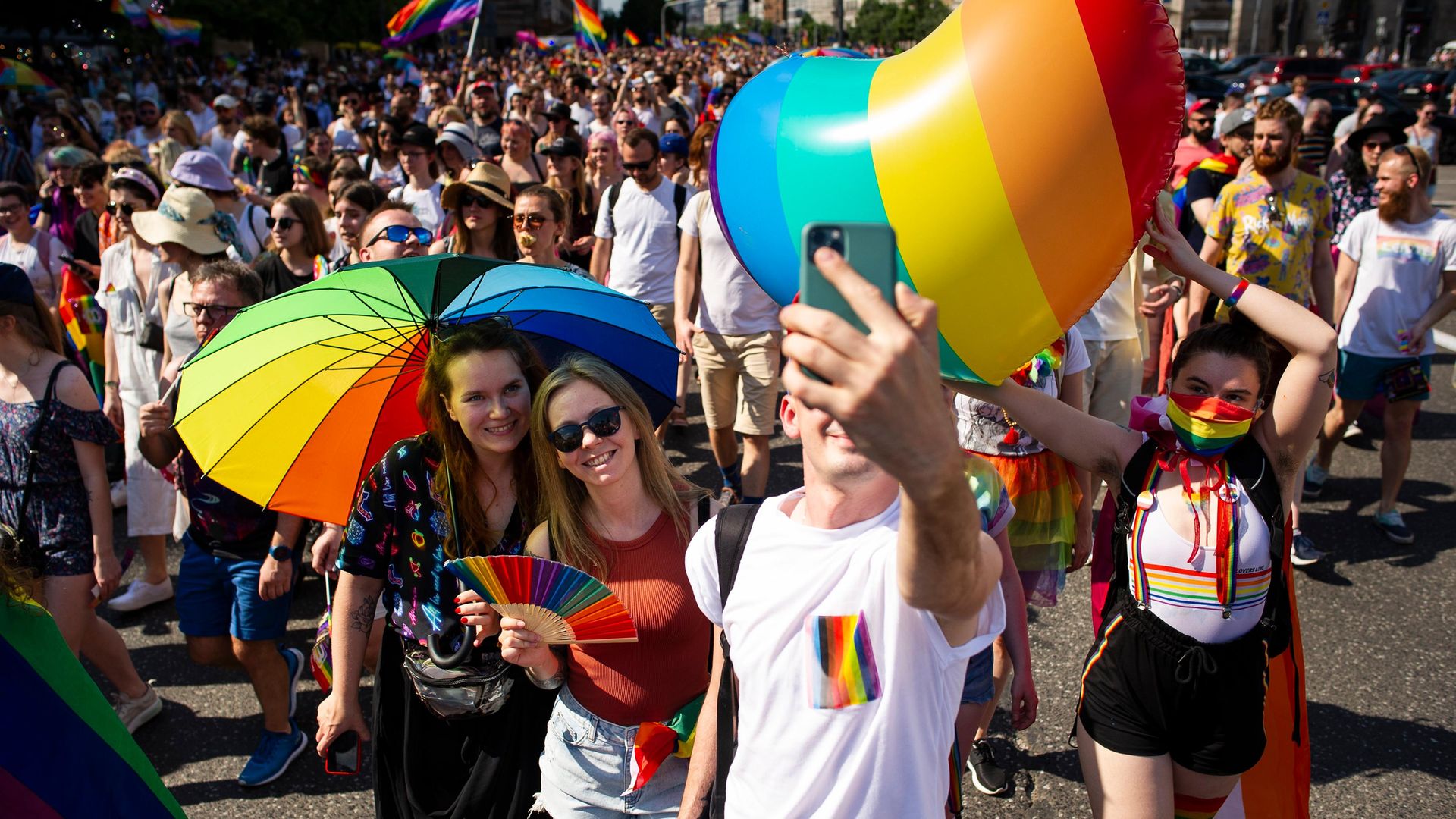
On a hot Saturday morning in Swidnik, it looked as if things might turn nasty. Last summer, this sleepy backwater in south east Poland was on the frontline of Europe’s culture war – a war which pits Brussels, with its metropolitan, liberal values of tolerance and inclusion against an increasingly strident small town conservatism mixed with nationalism.
Next to Swidnik’s war memorial, half a dozen activists were handing out heart-shaped stickers and iced doughnuts with multi-coloured sprinkles. “We’re the rainbow myth busters on a queer tour of the East,” said Bart Staszewski, a bearded young man in a smart jacket. “We’ve come to show people here that gay people are normal citizens”.
A crowd of 30 men on the other side of the street thought otherwise. Jeers and whistles were followed by football terrace chanting.
“Swidnik free of rainbow propaganda!” they yelled, drowning out the dance tunes coming from the speakers of the gay rights activists. Police stood by, sweating in full riot gear.
“We don’t want those kinds of people around here,” a man with a shaved head told me. “They are weakening the nation,” said another.
“War’s no longer about tanks and missiles. You destroy a country by making chaos. And that’s what these gays are trying to do.”
Such views are not limited to provincial bigots. In a campaign speech when he stood for re-election, president Andrzej Duda called the promotion of LGBT+ rights an ideology “even more destructive” than communism. The Archbishop of Krakow warned of a “rainbow plague”.
I once stumbled across dozens of people praying on their knees, in the centre of Warsaw, to save Poland from sodomy. They were horrified that some LGBT+ activists had draped a rainbow flag over the statue of Christ outside the Church of the Holy Cross. But outside major cities, especially in the less developed southern and eastern parts of the country, prejudice is rampant.
In 2019, Swidnik became the first municipality in the country to declare itself free from “LGBT ideology”. Around 100 local and regional authorities, many controlled by the ruling right wing Law and Justice Party, followed suit.
Some declarations were more nuanced, promoting traditional, heterosexual, God-fearing families. The resolutions are essentially symbolic and unenforceable but they soon made headlines. Before long the outside world got involved.
I decided to visit Poland’s Catholic conservative heartland after the EU imposed a rare punishment: six towns that had adopted LGBT-free resolutions were stripped of funding for their European town twinning programmes.
The mayor of Tuchow, near Krakow, admitted she felt hurt by the decision. But one of her councillors said losing the EU grant was no big deal, especially since the justice minister, Zbigniew Ziobro, whose party is even further to the right than that of president Duda, promptly gave the town a cheque worth three times as much.
The 250,000 zlotys gift (£47,600) came from the Justice Ministry’s special fund for victims of crime and the smirking councillor told me they would spend the money on the fire brigade instead.
For now, Tuchow can afford to tough it out. But this January, Nowa Deba, after being cold-shouldered by its Irish twin town of Fermoy, backtracked on the anti-LGBT+ policy. Six more regional entities have had a change of heart since last autumn.
The stakes were especially high for Krasnik, an hour’s drive south of Swidnik. It was cut out from a partnership with a French town and stood to lose millions of euros in Norwegian and European Economic Area funding for youth employment programmes.
Some residents including the mayor felt the anti LGBT+ resolution was an embarrassment and a costly mistake. They eventually managed to get it rescinded but faced fierce opposition.
It’s important to stress that many Poles are horrified by increasingly bitter attacks on gays and LGBT+ rights. Last month, Warsaw’s mayor Rafal Trzaskowski walked at the head of the city’s gay pride parade – which happens to be the largest in central Europe.
Thousands marched behind him, cheered on by people waving rainbow flags from balconies and pavement cafes.
Paradoxically, Poland decriminalised homosexuality as early as 1932 – decades before many other European countries. Yet according to one gay rights organisation, it is now the most homophobic country in the EU.
Poland’s science and education Minister Przemyslaw Czarnek wants to boost the role of government appointed inspectors in the classroom and rejects the idea that “inclusive language” should be used in schools. “In Polish”, he said, “satisfying sexual desire in a way different from the accepted norm is called perversion and deviation.”
Once a lecturer at a Catholic university, Czarnek has also claimed that “LGBT ideology comes from the same roots as Nazism” and that its adherents “are not equal to normal people”. Subtler politicians and their allies delight in semantics. They argue that the declarations are not homophobic or discriminatory because they refer, at most, to an abstraction – “LGBT ideology” rather than people.
“They say they have nothing against us”, said a teenager I met in a Tuchow park. “But when my boyfriend and I held hands in the street, we got abuse and threats. It’s only okay to be gay here if you hide it.”










